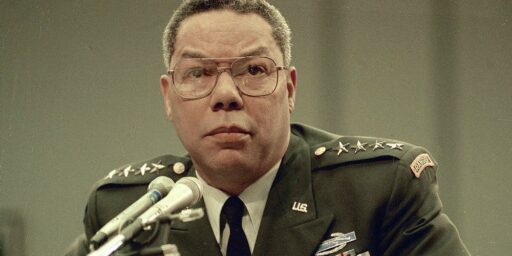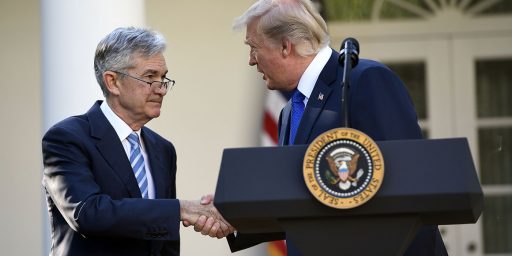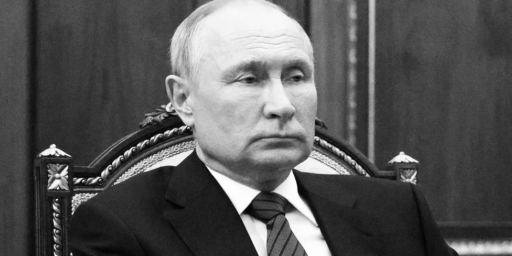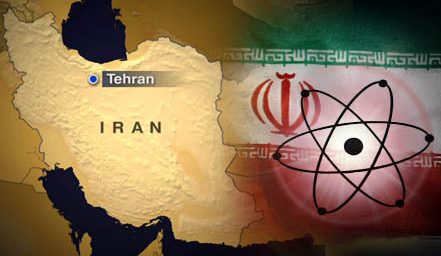Powell: White House ‘Never Told’ of WMD Doubts
Former Secretary of State Colin Powell has told the BBC’s David Frost that the intelligence community never communicated their doubts about Iraqi WMD to the administration.
White House ‘never told’ of WMD doubts (Herald Sun)
THE US administration was never told of doubts about the secret intelligence used to justify war with Iraq, former secretary of state Colin Powell told the BBC in an interview to be broadcast on Sunday night. Mr Powell, who argued the case for military action against Saddam Hussein in the UN in 2003, told BBC News 24 television he was “deeply disappointed in what the intelligence community had presented to me and to the rest of us.” “What really upset me more than anything else was that there were people in the intelligence community that had doubts about some of this sourcing, but those doubts never surfaced to us,” he said.
The BBC‘s account:
Questioned on the evidence held up by the US as proof that Iraq had a weapons of mass destruction programme, he said: “I was deeply disappointed in what the intelligence community had presented to me and to the rest of us, and what really upset me more than anything else was that there were people in the intelligence community that had doubts about some of this sourcing, but those doubts never surfaced up to us.”
On the one hand, the then-DCI, who was at least nominally in charge of the entire intelligence community as well as the CIA Director, infamously called the evidence “a slam dunk.” But we’ve certainly seen numerous contemporaneous memos since then. Could it really be that none of them made it to the top? That strikes me as incredibly unlikely.
Jeff Stein, writing for the San Francisco Chronicle October 2004, wrote:
At the time of the [Plame] leak, administration supporters of the Iraq war were determined to neutralize the CIA’s doubts about the White House case that Saddam Hussein possessed weapons of mass destruction, most notably nuclear weapons.
[…]
Cheney began visiting CIA headquarters to challenge its analysts over their intelligence on Hussein’s weapons. To Richard Kerr, the former chief of CIA analysis who later studied the agency’s pre-war reporting on Iraq, Cheney displayed no anti-CIA animus at the time. “My experience was to the contrary,” Kerr said by e-mail. “He would not accept all our analysis without skepticism and believed we were better on some subjects than others. But those are the characteristics of a good customer.”
Over at the Pentagon, however, Rumsfeld was reprising Team B by creating his own intelligence shop. The Chalabi organization’s alarmist reports on Hussein’s nuclear weapons, which later proved to be false, bypassed the CIA and went directly to the White House. “That’s why they set up an intelligence unit in [Undersecretary of Defense Douglas] Feith’s office,” said intelligence historian James Bamford. “The whole purpose was to get that kind of information and send it to Cheney.”
In 2002, CIA analysts thought so little of a report that Hussein had obtained uranium yellow cake from Niger to build a bomb that they didn’t even include it in the president’s daily briefing, Bamford said. “The Pentagon got it and flagged it to get Cheney’s attention,” he added, riling the White House further. Then covert CIA officer Plame, a specialist on weapons of mass destruction, helped arrange for her husband, career diplomat Joseph Wilson, to investigate the yellow cake claim in Niger.
Perhaps Stein’s report should be viewed skeptically, since nobody was arguing that Saddam possessed nuclear weapons, merely that he was actively pursuing them?
A CBS story from July 2004 noted that there was indeed substantial evidence that Saddam had WMD and even multiple verification for the infamous “yellowcake” intelligence. It cited then-recent reports by Lord Butler and the Senate Intelligence Committee. But even contemporaneously, we know there were doubts about many of the claims made at the time. That’s not surprising, after all, most intelligence has to be interpreted and is subject to doubt.
Dafna Linzer and Barton Gellman had a front page story in April that’s begins:
As former secretary of state Colin L. Powell worked into the night in a New York hotel room, on the eve of his February 2003 presentation to the U.N. Security Council, CIA officers sent urgent e-mails and cables describing grave doubts about a key charge he was going to make. On the telephone that night, a senior intelligence officer warned then-CIA Director George J. Tenet that he lacked confidence in the principal source of the assertion that Saddam Hussein’s scientists were developing deadly agents in mobile laboratories. “Mr. Tenet replied with words to the effect of ‘yeah, yeah’ and that he was ‘exhausted,’ ” according to testimony quoted yesterday in the report of President Bush’s commission on the intelligence failures leading up to his decision to invade Iraq in March 2003. Tenet told the commission he did not recall that part of the conversation. He relayed no such concerns to Powell, who made the germ- warfare charge a centerpiece of his presentation the next day.
That was one among many examples — cited over 692 pages in the report — of fruitless dissent on the accuracy of claims against Iraq. Up until the days before U.S. troops entered Iraqi territory that March, the intelligence community was inundated with evidence that undermined virtually all charges it had made against Iraq, the report said. [emphasis added]
After several paragraphs describing an “echo chamber” on some other bits of intelligence used in various speeches to make the case for war, we are told:
“These views were expressed to CIA leadership,” the commissioners wrote, including to McLaughlin and his assistant. But they were also watered down as they moved up within the intelligence community, and were never shared with outsiders. “We found no evidence that the doubts were conveyed by CIA leadership to policymakers in general — or Secretary Powell in particular.” [emphasis added]
In his famous 1973 book on the Cuban Missile Crisis, “Essence of Decision,” Graham Allison described the ways in which flawed decisions are made in government. He created three models, all of them based on the nature of bureaucracies and the way they pass information up the ladder. Amazon reviewer Tansu Demir provides a concise and reasonable summary:
The analyst looking to Cuban missile crisis through the lens of “rational actor model” conceives of governmental action as a “choice” made by a unitary and rational nation or national government. In this model, national government is treated as if it is an “individual” identifying problem, producing solution alternatives and picking one of those alternatives up whose result would satisfy the expected utility function of the nation best based on the “purpose” of the nation. The rational actor model analyst generates hypotheses, for example, about why the Soviet Union decided to send nuclear missiles to Cuba: to defend Cuba, rectify the nuclear strategic balance, or provide an advantage in the confrontation over Berlin? The virtue of the model comes from its power of explanation especially in case it is able to expose the “purpose” of the nation/state. So all the puzzling pieces of the relevant issue under question are to be tied into a coherent and satisfactory story.
The rational actor model falls short of fully understanding of the issue under question in that it does not take account of other equally important considerations. Admittedly, the rational actor model neglects the organizational processes and capabilities that structure the issue or problem under question, and, limit or extend the policy alternatives available to “rational” policy actors. In final instant, it is manifest that policy executives have to decide policy alternative from the “menu” that current organizational technologies and capabilities write. In organizational behavior model, the analyst investigates, for example, the standard operating procedures (SOP) of government organizations in order to understand which policy alternatives are available to political actors and which one is chosen and why. So, the organizational behavior paradigm closes the gaps of the rational actor paradigm.
Finally, the governmental politics model conceives of governmental policy under question not as a rational actor choice or organizational output but as a “resultant” of bargaining along regular circuits among players positioned hierarchically within the government. In this model, the political actors and their intentions, positions and interests, their relative power, the action channels through which the political actors input and exert their influence, decision rules and similar matters stand to the fore in analysis.
While we always presume that goverment works as a rational actor in major policy decisions, with the president and his key advisors receiving all information available, it is almost certainly the case that some combination of the organizational behavior and governmental politics models were in operation here. There is so much information filtered through an admittedly stovepiped and political bureaucracy that perfect information is not possible.
That Powell gave his speech to the U.N. thinking he was conveying the overwhelming consensus of the intelligence community is quite probable. While many of us have qualms about the job Powell did as Secretary, his integrity has never been in question. Still, it strikes me as highly implausible that the Secretary of State and other National Security Council principals had no inkling that there were dissenting views.
Hat tip: Mark Moore






Powell is full of it. He knew at least as much as I knew, at least as much as we all knew about Iraq.
1) Highly qualified weapons inspectors had unlimited access to any site, any time, any way they wanted within Iraq.
2) Acting on the best intellegence information the United States had they found nothing incriminating.
My conclusion, and certainly anyones with the reasoning ability above that of a stubborn two year old, was that the intellegence was obviously wrong.
Hence any statement that Iraq had WMD, or even had a program to build them, at the time in question, was certainly not true. Hence the Bush justification for war was simply a lie.
When Powell went before the UN, he certainly knew at least as much as I did. He therefore lied. It is really that simple.
Why? Just on the face of things, it seems immensely likely — after all, there are probably thousands of memos a day being generated. Are you really suggesting the DDI should pass them all to the DCI and on to the SECDEF, SECSTATE and POTUS?
Of course not. What the Directorate of intelligence does is summarize all the memos, argue out what they hope is a coherent and mostly correct position, and pass it on to their “customers”.
Powell could not have made general or Sec State by being that naive about government bureaucracies. He is a creature of systems just like the CIA.
The critical factor is the shades of meaning in the word “pursuing” – as in “pursuing nuclear weapons.”
One might be “pursuing” but totally contained, or one might be “pursuing” and making great progress.
Land war in Iraq is really only justified by the latter, but a great number of tv pundits treat the two meanings as interchangable.
Oh Oh, see how the Bush haters are starting the spin machine already. To bad they will do or say anything to “prove Bush Lied”.
Whta will they do when it turns out that “They are Wrong”.
Oh Oh, see how the Bush chauvinists are starting the spin machine already.
Get real, Herb.
Well, as the whole ‘invade Iraq’ concept was spinning up, it was also quite apparent that Powell’s opinions (and entire philosophy) about foreign policy were becoming more and more unwelcome in Bush’s inner circle. I have no doubt that there were a great many things that Powell was kept ‘out of the loop’ on.
That said, if Powell _is_ correct, and the intel communitiy’s doubts _didn’t_ filter up to the President, the coercive (and corrosive) influence of Cheney, backed up by Tenet’s sycophancy, seem the most probable reasons…
Lee:
Your name Lee, Is that the same as the Lee that waved the white flag and surrendered?
You guys are all alike, One track minds and a white flag. That seems to be your banner.
Even if we were to accept this rather outlandish claim, for the President to start a war without making it his business to make sure he had ALL the information available in front of him would represent a failure of leadership of historic proportions.
I’m just an ordinary citizen who reads a conservative daily newspaper and I knew Iraq didn’t have WMD’s. The local papaer carried the reports from the UN. If Bush didn’t know about the UN reports that cast doubt on the existance of WMD’s, then he should have known. Of course everyone in Congress should have known too.
Bush got us into this war on a wave of post 911 warfever. Now it turns out that even Bush has to acknowledge that Saddam didn’t have anything to do with 911. So what if he wasn’t told what any member of the newspaper reading public knew? Not an excuse. Not a excuse for fearmongering, jingoism and misrepresentation.
Anjin-san,
So you think the President should “make sure he had ALL the information available in front of him?” That is a completly unrealistic expectation: I can’t imagine how many pages of information a day was generated regarding Iraq in just 2002. One of the functions of the intelligence community is to analyze, interpert and summarize all the relevent data and present it to the President in a digestable format. They are supposed to have the experience and skill to do that; the President’s mission is to create policy not conduct analysis.
Folks, look how actively folks were leaking to Sy Hersh & others.
You think they went to the papers first? B.s.
I’m sure many or most of these “senior CIA officials,” etc. tried to blow the whistle … & got frozen out. Unless there was such a climate of fear that they didn’t dare. (I don’t think Cheney’s boys learned hardball on the Plame case.)
Jim,
OK how about this.
The president should have asked if there were any doubts about the validity of the intel.
Going to war without seeking contrarian viewpoints is the sign of someone who just wants to go to war.
There should have been a contrarian task force in the White House.
Would it be to hard for the President to ask, “Are we damn sure that we are right about this”? before he sent American boys to die?
Guess so…
Ed Morrissey has an interesting obervation at Captain’s Quarters: